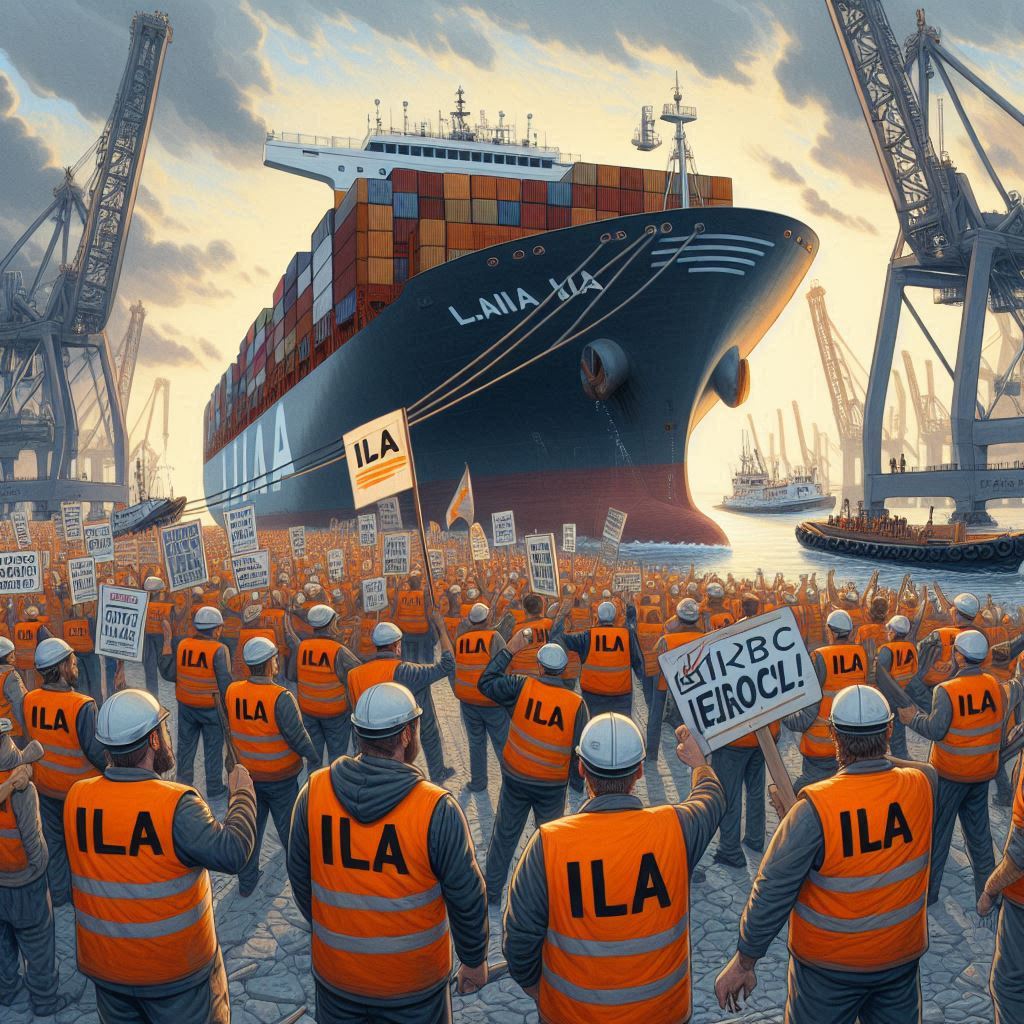No One Knows What Will Happen with ILA Port Disruption
“Nobody knows anything.” If I were Joe Biden, I’d make up a story about my father or grandpop telling me that when I was a kid as we all discussed blue collar issues around the dinner table. But it’s actually a famous quote from William Goldman, screenwriter of Butch Cassidy and the Sundance Kid and The Princess Bride. He was talking about the film industry and what movies will be successful. However, he could have been talking about the current situation with the International Longshoremen’s Association (ILA) contract extension and if it will cause disruption at East and Gulf Coast ports.
There’s a dichotomy of opinions on what will happen.
On one side, there are people who think the ILA will reach an agreement with the United States Maritime Alliance (USMX) with little drama before the current contract expires. Shippers would love that. It would mean no port disruption, no costly cargo delays.
On the other end, there are those who think there’s little chance of that happening. There are too many warning signs that the two sides won’t reach a deal by the contract expiration deadline. Those of this opinion think the ILA strike threatened by the union’s president, should no deal be reached by the September expiration, is likely. That’s a shipper’s nightmare. Resulting port shutdowns all up and down the East and Gulf Coast ports would be incredibly damaging, not only for shippers, but the U.S. economy as a whole. Such a scenario could easily cost the economy billions of dollars per day.
What do those closest to the situation think?

Mixed Opinions from Management Sources on Strike Threat
Of course, we already knew the cost of a strike at East and Gulf Coast ports would be high. And the risk certainly exists. But how likely is it? That’s where nobody knows anything because even those involved have a wide gap between opinions on the situation. In the Journal of Commerce, Peter Tirschwell reported on divided management opinions about the likelihood of an ILA strike:
Beneficial cargo owners (BCOs) [as well as small to medium importers and exporters] can take comfort in the view of some management sources contacted recently by the Journal of Commerce who believe there is sincere interest on both sides to reach a deal ahead of the contract expiration, and that a deal will likely get done without disruption. Carriers who are rarely assertive at the bargaining table with longshore labor over many years are likely to cut a lucrative deal for labor and call it a day, others believe. Some carriers say they are seeing some diversions to the West Coast ahead of potential labor disruption, but not a lot.
“We feel labor will get a new contract and a [wage] increase but not do anything to give a reason to shippers to consider diverting cargo,” said the head of logistics for a household goods retailer. “We have always felt that East Coast labor is more commercially minded.”
But the sanguine view is not unanimous. Some management sources remain in wait-and-see mode, withholding opinion until the union reveals its latest wage increase demands upon resumption of “big table” — or coastwide — discussions that will occur once local agreements are either wrapped up in the coming weeks or unresolved issues are kicked up to the big table. Some of those local contracts are already concluded, while others are still being negotiated or encountering difficulties, sources say.
Some observers see warning signs. Specifically, they relate to wage increase demands by the union that might be too high for ocean carriers who dominate the United States Maritime Alliance (USMX) management group to accept.
Wage Demands Biggest Warning Sign?
There are many points to be negotiated when it comes to a new ILA contract. Particularly, there’s a giant fight to be had over automation. ILA President Harold Daggett went so far as to call these contract negotiations the most challenging in the union’s history. And it has a long history; the ILA was first founded in 1892. So why are wage increases the biggest warning sign that ILA contract talks could be on their way to port disruption? Because the union won’t touch any of the many other contract issues, including automation, until wages are worked out. That’s according to Daggett back in November:
“I want wages done first,” Dagget said, “and then we’ll sit down and negotiate the contract.”
Thus, it’s no surprise that, in his JOC article, Tirschwell focuses in on wages when it comes to warning signs that ILA talks could turn disruptive. Tirschwell wrote all about the ILA’s negative reaction to the recent International Longshore & Warehouse Union (ILWU) contract extension, in which the dockworkers union on the West Coast received a $70 million bonus and a 32% pay increase for its workers:
… Daggett expressed dissatisfaction with that result, which he sees as having been forced on the ILWU by the Biden administration in its attempt to avert further disruption and economic and political problems.
“When the ILWU was going through talks, you’d think he would have picked on the foreign companies out there that are setting up automation and getting rid of American jobs, but he didn’t do that,” Daggett told a meeting of ILA locals in Nashville in November, as reported by the Journal of Commerce. “He went after the ILWU, telling them to get this contract signed.”
The implication is clear: Whereas the ILWU allowed Biden’s representative, acting Labor Secretary Julie Su, to facilitate a deal and quash further disruption at West Coast ports, Daggett will be less receptive to pressure from Washington, and according to sources, has said as much privately.
It’s not just privately Daggett has shunned Washington pressure. Heck, it’s not even just pressure. He’s shunned all mediation from the administration of “the most pro-union president in history,” as President Biden still calls himself. In November, when Daggett warned ILA members to prepare for the loss of income from a strike in September, he said publicly, “We will not be interested in Biden sending us a mediator if negotiations are not going well.”
Because of the union’s wage demands, negotiations have not started well. There were early contract extension talks between the ILA and USMX that reportedly broke down specifically because of ILA’s wage increase demands. The enormous pay increases the ILWU got clearly don’t seem good enough for the ILA, and the ILA seems unwilling to bend on the issue.
That doesn’t bode well for negotiation completion before contract expiration. However…
We Should Know More in a Couple Weeks
Daggett did give clearance for local ILA negotiations, as referenced in a Tirschwell quote above. Local negotiations are a precursor to the larger, Coasts-wide negotiations. Daggett gave these local negotiations a mid-May deadline on getting done.
Recapping Tirschwell above, some of these negotiations have had success while others are hitting difficulties. In a couple weeks, if the results of the local negotiations are predominantly positive, the outlook on the overall contract negotiations should be more optimistic. That leaves the inverse as also true. If there are several major issues arising from the local negotiations, the overall outlook should turn more pessimistic.
In our next post, we’ll talk about how shippers should be preparing future imports and exports with the ILA situation in mind.





